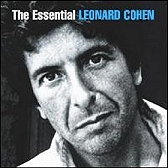





Liner Notes
There is a poetic rightness in having an essential Cohen, in part because he's always been so essential to the rest of us (keeping one eye firmly on the times and one eye on the timeless), but even more because essentials are what he lives off. There are almost no clocks in Cohen's work, and even though the details ("It's four in the morning, the end of December") are often scrupulously exact, they're always there to take you to something deeper: love, jealousy, the imminence of loss. No distractions, nothing extraneous. Cohen has always made a practice of defying every category--he's a community of one--even as he has moved from poems to novels to songs: the only writer I know who managed to become an international singing sensation, the only #1 performer who's also been a prize-winning poet. He tops the charts in Norway and Malaysia, and you hear his spirit behind every new generation of poet-songwriters (there are 12 tribute albums to him worldwide). He defined the Sixties for many of us, with songs like "Suzanne" and "Bird On a Wire"; he caught the bravado of the Eighties ("First We Take Manhattan"), and, having already plunged deep into the time out of time ("Night Comes On"), he then summarized the Nineties ("The Future"). When everyone had counted him out, he looked in on us again, from his cabin high up at the Mount Baldy Zen Center, and told us what was essential in the 21st century too. Yet what strikes me most, listening to these songs all at once, is how little in some sense he's changed; the changeless is what he's been about since the beginning. If you think of some of the other great pilgrims of song (Bob Dylan, say, or Van Morrison or Joni Mitchell), you see them pass through philosophies and selves as if through stations of the cross; with Cohen, one feels that he knew who he was and where he was going from the beginning, and only digs deeper, deeper. Listen to the "Master Song" here, and recall that it was written six years before he fell in with a Zen master, Joshu Sasaki-roshi; lose your heart, 35 years later, to "Alexandra Leaving," and remember that he was writing of "Alexandra's double bed" 23 years before, at the beginning of "Death of a Lady's Man." The moon passes through different phases--shows us a different face every night--but it's always the same moon. I went once to visit Cohen in his lonely perch atop the mountain, and what I remember, more even than the mellifluous and elegant presence (the most articulate writer I've ever met), was his stillness: beneath the words, deeper than that figure in black walking around a pine tree in near-snow after midnight, was someone else, lost in meditation. Leonard Cohen has been famous in the public eye as actor, agent provocateur, lay theologian and courtly lover; but beyond all that, the person from whom the songs issue is unknown even perhaps to himself. When I called Cohen to ask him about this new collection, he said it was "crammed with stuff" (chosen by him, and, you will notice, flowing like one steady stream--a dark river seen by moonlight--through nearly every one of his ten albums, equally distributed between the riddled ballads of the searching young man and the composed verses of the monk of 67). Yet most of us who listen to it will find our minds crammed with all the songs that could have been here--"The Stranger Song," "The Window," "Light as the Breeze." It's hard to pick an essential Cohen because he's already done it for us; the songs he presents for our nourishment are never half-formed or unconsidered. Large notebooks are compressed into six tight verses meant to last. You will hear, perhaps, that "Hallelujah" was recently chosen as the greatest Canadian song of all time and you will catch the echo of songs like "Democracy" and "If It Be Your Will" every time you go to the movies or enter a cafe. The Zen monks of Kyoto devour his work, late at night, while the women in Iceland dream about this elusive gypsy. Cohen takes us, at heart, into a mythic place, an ageless space alight with goddesses and God, where we see a lone figure walking down the road, in dark Buddhist robes, with a Torah in one hand and a picture of a woman in the other. Always in our sight even as he disappears into the dark. Pico Iyer |
